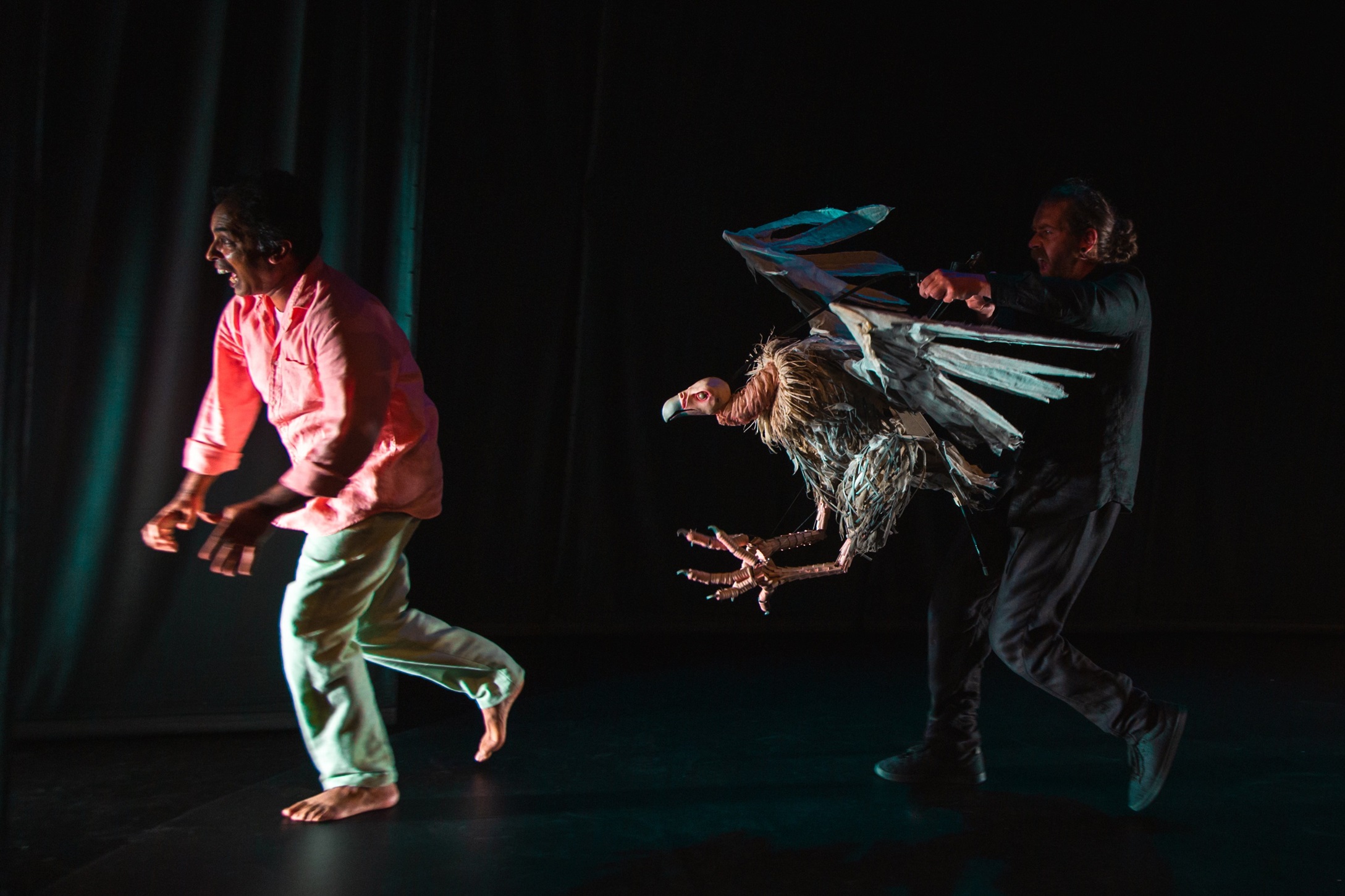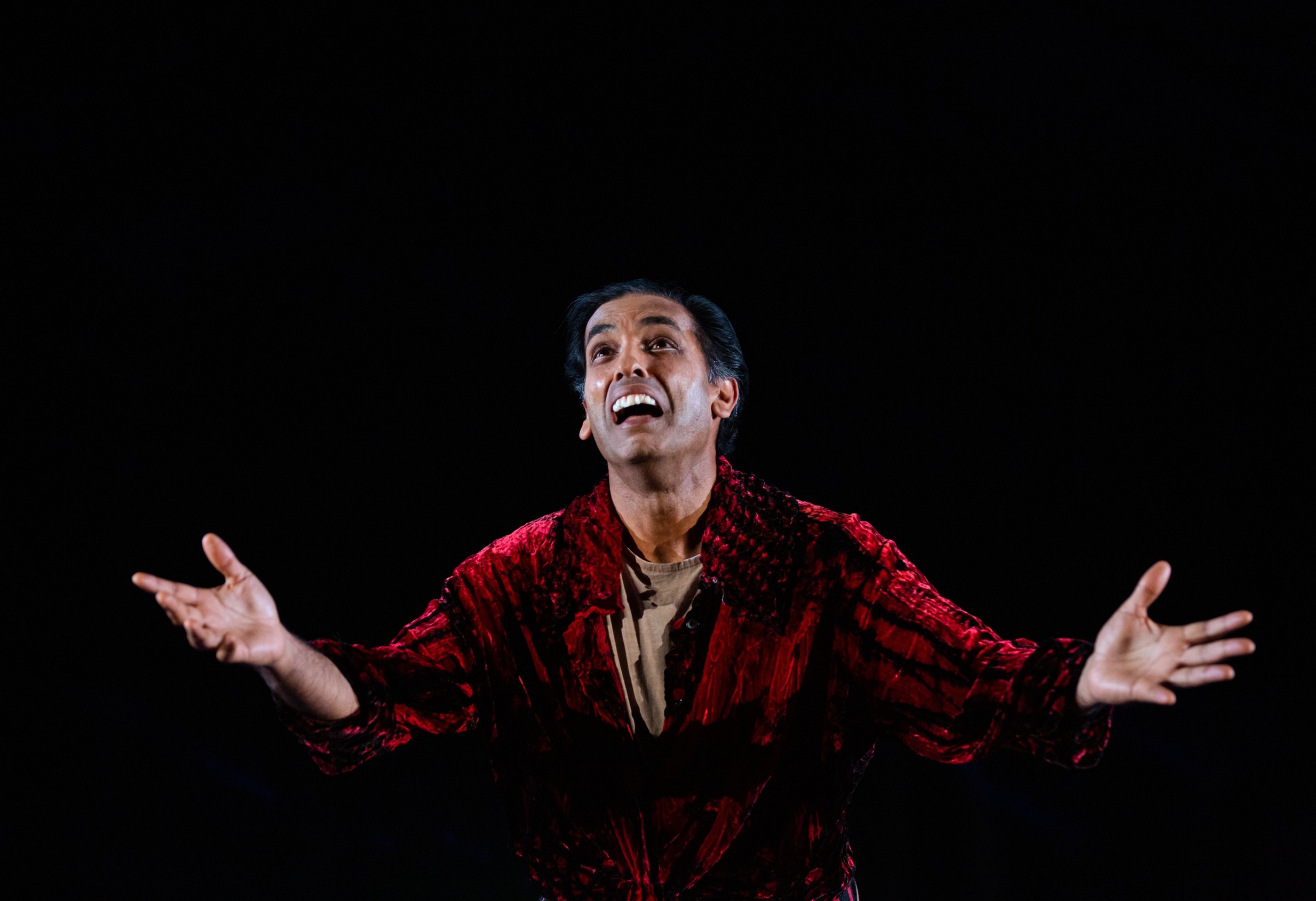
Being chased across the stage by a life-sized vulture is nothing unusual for Jacob Rajan.
"It’s a bit of a sore point for me, actually, as an actor. When I’m on stage with that thing, nobody’s looking at me."
For nearly 30 years Rajan and his Indian Ink co-founder Justin Lewis have been surprising and delighting audiences with their quirky works, which behind the masks, puppets and comedy, ask some important questions.
"How do you face your mortality? What is the nature of happiness? Those big kind of questions that are the things our characters are wrestling with in the plays. We’re sort of scientists of the soul, trying to figure that stuff out through the work."
Only rarely does a play come up with the answer though.
"I mean, what’s the nature of happiness? At the end of that play, the nature of happiness was a good redfish curry. The small things was the point. And generally that’s the way it goes with the philosophy in the plays. You’re looking at big questions and coming up with more mystery. So I think asking those questions is important.
"When we lose our curiosity about those questions, that’s tricky. When we hand it all over to artificial intelligence or something like that, that’s going to be very, very tricky."
Despite asking the big questions, their works always approach the story with a good dose of humour.
"It’s all about the fun as well. We do quite deliberately use comedy to examine things, to open people up. You know, you open the audience’s mouths with laughter in order to slip something serious in."
In the case of Paradise or the Impermanence of Ice Cream, it had its genesis in a trip Lewis and Rajan did to India before the Covid pandemic to research another project. With a couple of hours to kill in Mumbai, they got their driver to take them to exclusive Malabar Hill, where some of the most expensive real estate in the city is, and to the top gardens where they could see some towers above the tree canopy.
"We were told those are the Towers of Silence."
Curious, the pair asked for more information, discovering the 8m-high "Towers of Silence" or dakhma are where the Parsi community leave their dead to be disposed of by vultures.
"We thought ‘oh my gosh, this is pretty grim’. So I was kind of fascinated by that."
So Rajan continued to read about the religious practice.
"Then it just got stranger and stranger because I didn’t realise that over about a course of 10 years, India’s vultures had disappeared. You know, there were billions of them. And they were gone. And the Parsi community, whose religion is wrapped up in the vultures taking their dead to paradise, they were one of the first ones that were alerted to the fact that their bodies weren’t being eaten. So this mystery started to really tug."
It took a long time for the Parsi community to discover what was causing the vultures to die. As the birds are associated with death and "kind of creepy" nobody really cared about them. Rajan discovered they are "nature’s sanitation department" as they clean up all the dead things, so when they are removed from the ecosystem it leaves a problem.
"The vultures is sort of the serious bit, I guess. It’s an incredible, phenomenal event that nobody really knows about. It’s the fastest mass extinction of all time.

The play developed during the Covid lockdowns when Indian Ink found itself unable to do what it does best — perform. It began to tour the show after the first lockdown, before getting shut down again during the second lockdown, meaning shows in the South Island never happened.
"It’s not like it’s an easy industry, especially when you have a blanket ban on mass gatherings. For a moment, you think, ‘wow, that was a bad idea. That was a bad career move’. But weirdly, coming out the other side of it, I love it even more."
Rajan takes the lead on the stage, playing nine characters, including a Parsi woman and a man trying to get to paradise.
"We kind of were in this phase of thinking, ‘we’ve written plays that have characters that we love. It seems really wasteful to just throw them away at the end of the show’. So there’s a couple of plays now where we’ve just asked the question, ‘I wonder what they’re up to now?’ And away you go. You’ve got a character fully formed, but you just dream up a new scenario or a different time in their life to have a look at them."
Using a character they love from their award-winning Guru of Chai, Kutisar, they have added another chapter to his life.
"We had the real-life mystery and we had this character that we loved. And so we had to find a way of sticking him in Mumbai and getting him involved in the Parsi community."
Rajan uses his infamous "teeth", a nod to the mask tradition of Indian Ink, to transform him from character to character and give him a "lift" in terms of making that transformation.
ON stage with Rajan is the vulture, a puppet made and controlled by puppeteer Jon Coddington. They are privileged to have the puppet maker operate it on stage, something that does not normally happen, Rajan says.
"But we’ve got the guy who knows every inch of this thing that he’s made, and brings it to life in the most extraordinary way. You’re sort of revolted by it, but by the end you love the thing. That’s one of the points of the play, that vultures are sort of a maligned creature, but by the end of it, you fall in love with it."
Rajan has seen the birds in flight and can see their beauty in the air.
"On the ground, close up, it’s another story, but in the air they’re just stunning."
For Rajan the beauty of theatre is being able to give the audience an "imaginative task" of filling the quite empty stage they use by imagining them in the busy city of Mumbai.
"It’s not Netflix. It’s not spoon fed to you. Although you don’t realise it, you’re actually doing imaginative work. And that, I believe, is far more nourishing for your soul. I certainly feel it when the audience comes to our shows. It’s something they don’t realise they’re thirsting for. To actually be in a room together and have a collective experience is quite precious these days."
As their works are usually toured, whether nationally or internationally, their sets have to be pared back and able to be transported in a suitcase preferably, a trailer and car at worst. For Paradise the vulture can be dismantled and packed up and all up the set fits into seven bags.
The backdrop of the set is a projection of impressionistic paintings to create a surreal backdrop that suggests locations in the play complemented by a soundscape featuring real-life sounds from Mumbai-like traffic noises and animal sounds.
"You really will believe the tapping of the ice cream scoop or the pulsing of the food processor. You will see those objects even though they’re not there because of the sounds. That’s quite an amazing thing the audience is doing with their imaginative work — seeing an entire ice cream shop appear before them without it being there. It’s magical that way."
Paradise or the Impermanence of Ice Cream is their 10th show and they have No 12 in development but all their shows are developed so they can be pulled out and performed whenever needed.
"Our storage shed is getting a little full, but that’s the theory."

"They’re just really good yarns, really good stories, so we can pull them out at any time. So the beauty of having a show that has a long life is that every time you perform it, it gets better and better."
As it is a theatre performance they can tweak it, or throw in current-day references if needed, to freshen it up for the next round of shows. He recently performed Guru of Chai in Whangarei, a show that is coming up to its 15th anniversary, and they put Krishnan’s Dairy "to bed" in 2022 after nearly a quarter of a century performing it. Another show, Mrs Krishnan’s Party, continues to tour in the United States.
"That’s sort of a very sustainable way of having a theatre show. Rather than making something and throwing it all away, we can bring it back.
"So it’s good to be able to actually put them down for a while and then pick them up again. And the characters all get deeper. The story gets richer and tighter."
It flies in the face of today’s mindset where value is put on the "new" and the "fresh", he says.
"The way we look at it is that you can find the new in the thing that you’ve done before. With the right mindset, you just go deeper rather than just continually grabbing for the shiny thing."
Lewis and Rajan have also been at different places in their lives when re-producing these shows, which also sheds a different light on them.
"The first one I wrote was Krishnan’s Dairy where I was writing about this married couple. And I was a young man. I wasn’t married, but I’d written that. By the time, 25 years on, I’d done everything that couple had done. I’d had a baby. I’d been in a long relationship. I knew the weight of the baby. All of those things just got deeper and deeper in my performance."
Performing multiple characters each show has become a "muscle" for him.
"If I’m getting really philosophical about it, the idea of playing multiple roles is actually not a stretch from what any human being is. You’re a mother, a daughter, a sister, all of those masks that you wear. You’re a teacher. Whatever your career is, they’re all different ways of being. I just stretch it a bit further."
He has found that with Paradise as well, where the character flicks between himself as a young man and himself as an old man.
"Now, I straddle both of those things now. So I really know it in my bones. So that’s sort of the joy of doing theatre for me, that I can do that."
A great proponent of the need for society to connect, to be in a room together believing in something together for a short time, Rajan says storytelling is at the heart of humanity.
"Because that’s what theatre is. It’s make-believe. We’re all pretending. And this thing that’s happening in front of us. And I think that’s a beautifully human thing with storytellers. If anything, that moment of Covid has really distilled that and the importance of it for me. So I think the success has been sticking to our guns."
But it also means they need to continue to create shows that make people want to come out to see them.
"It’s a big ask and we need to reward that."
TO SEE:
Paradise or the Impermanence of Ice Cream, Indian Ink, Regent Theatre, Dunedin, September 5.












